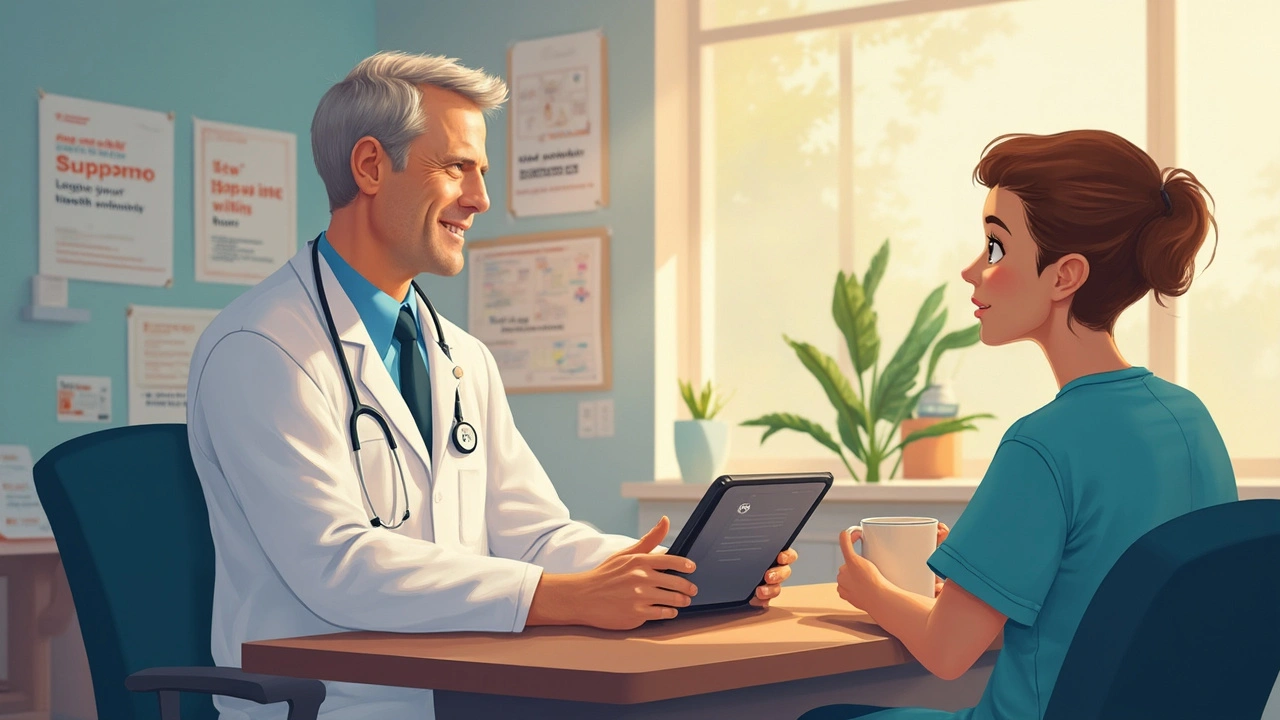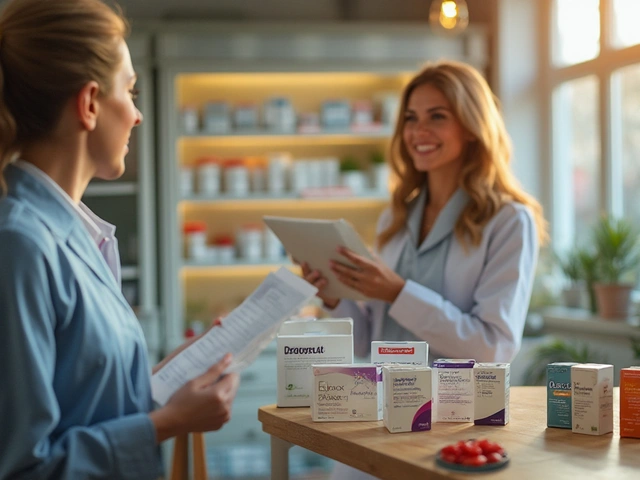Why People Outgrew WebMD: More Than Just A Symptom Checker
Type in a sore throat or headache on WebMD, and you’ll get a flood of possibilities—usually capped off with cancer and a sense of dread. We’ve all been there, feeling worse after a quick self-diagnosis. WebMD’s lightning-fast symptom checker made health answers accessible, but it struggles with details, context, and nuance. It treats a 27-year-old marathoner and a 70-year-old retiree almost the same, missing out on key differences in lifestyle and health history. Accuracy is hit-or-miss. Plenty of doctors have shared stories about patients showing up convinced they have the ‘worst case scenario’ after one click too many. That anxiety isn’t harmless—some surveys show up to 30% of users experience more stress after using symptom checkers like WebMD.
So why do people still rely on it? Speed, mostly. WebMD’s interface is a breeze. But it’s outdated. It doesn’t always reference the most current studies or medical guidelines, and it can lump rare but deadly diseases in with the common cold. A study analyzed several symptom checkers—including WebMD—and found accurate diagnoses in less than half of the cases. Think about it: if your mechanic got your car’s problem wrong more than 50% of the time, would you trust them? Probably not.
Another problem is the one-size-fits-all approach. You wouldn’t want your dentist to treat your broken foot, right? Yet WebMD applies a generic brush, without digging deep into age, gender, or personal risks. The reading level is uneven, too—some pages are clear, others feel more like technical manuals. Not so friendly if you’re already worried about your health.
And let’s not forget: WebMD makes money through partnerships and ads. Sometimes you’ll spot sponsored medications or services nudging you toward their products. That’s not always bad, but it skews neutrality. Some users wonder if the advice is truly unbiased. When you’re concerned about your health, objectivity shouldn’t be negotiable.
Given all this, it’s hardly shocking that people crave something better than WebMD—and the web’s new tools don’t disappoint. Platforms now offer personalized insight, deeper specialization, and stuffy-lecture-free guidance. The goal isn’t just answers; it’s peace of mind and real expertise, tailored to your needs.
Specialization: Where Smart Platforms Beat WebMD
Ever tried to figure out if your skin rash is dangerous or just annoying—and ended up tangled in a sea of vague info? You’re not alone. What sets today’s best alternatives apart is their laser focus. Instead of spreading thin, these sites drill deep into specific conditions, patient types, or care needs. That’s game-changing for anyone with chronic illnesses or rare diseases.
Take Mayo Clinic or Cleveland Clinic—these aren’t faceless corporations. When you’re searching, you see medical reviewers front and center. Many articles list the credentials of authors and reviewers, giving content real credibility. If you’re dealing with something niche, like Ehlers-Danlos syndrome or a challenging mental health condition, organizations like NORD (National Organization for Rare Disorders) or Psych Central serve up insights with an expertise that generalist sites just can’t match.
Health platforms now cater to age, gender, and lifestyle, too. For instance, KidsHealth is like a treasure trove for parents. Instead of drowning in adult-centered advice, you get child-focused info written for curious young minds and their grownups. Women seeking nuanced advice turn to Women’s Health.gov or EndocrineWeb, where topics range from PCOS to hormonal health—places where details actually matter. Now, platforms like Men’s Health offer real advice for issues guys aren’t always comfortable bringing to a doctor, like sexual health or fitness troubleshooting.
Even mental health gets its own expert haven. Therapy platforms like Talkspace and BetterHelp blend easy access to licensed counselors with useful content about anxiety, stress, and relationship struggles. Folks in chronic pain get specialized outlets like The Mighty, where community-based advice blends with research-backed resources. The beauty? It’s not just text—many sites now incorporate forums and peer support right alongside medical guidance.
Compare that with the blanket advice on WebMD. Quirky symptoms and specialized conditions need contexts most big sites just can’t provide—or at least, can’t provide well. That precision makes a world of difference if you’re trying to manage ongoing health issues, understand complicated test results, or just feel a bit less alone in your experience.

Accuracy and Updating: The Edge Trusted Health Platforms Have
If you’re relying on a single website for health decisions, accuracy isn’t just “nice to have.” It can literally be a matter of life and death—no exaggeration. One of the main reasons health professionals prefer sites like Mayo Clinic or the CDC is that they’re obsessive about updating. Medical knowledge moves fast. What was true five years ago could be debunked now. Some diseases have totally new guidelines due to better research. For instance, recent changes around cholesterol or ADHD made headlines; mainstream sites can lag behind, but specialized platforms update within weeks or even days.
Peer review sets the gold standard. If you see references to scientific journals, real-world clinical trials, and medical editors’ names, odds are you’re in good hands. For example, the National Institutes of Health (NIH) hosts MedlinePlus, which only includes content that’s been meticulously vetted by experts. You’ll see clear links to published studies and clear dates for the last update—if it’s more than two years old, that’s often your sign to be cautious.
What about controversies or breaking news? Here’s where WebMD sometimes drops the ball. Sites like Healthline, CDC, or Johns Hopkins are constantly updating with breaking health alerts (think COVID-19 new variants or FDA drug recalls). Ever really wonder where your favorite search engine ‘snippets’ get their info? It’s often these platforms, not WebMD. They set the pace for digital health news.
Want some data? A peer-reviewed 2023 analysis found that some leading health information platforms delivered 70-80% diagnostic accuracy versus about 51% for generic checkers like those on WebMD. That’s a gap you can’t ignore if you want the best odds for sound advice. And if you’re looking for what’s better than WebMD for reliability, find a curated list right here.
The key tip is to check for transparency. Look for dates of publication, clear author names, and links to original studies. If a site claims a “new breakthrough,” dig deeper: do reputable organizations back up their claims? The best platforms make their evidence easy to find and understand—no medical degree needed.
User Experience: More Than Pretty Buttons—Why Accessibility Matters
It’s not just what you read—it’s how you’re meant to understand it. If you land on a wall of jargon or must click through ten ads, are you going to absorb that info? Doubtful. The latest health platforms put user experience first. Accessibility, simple language, and interactive features set these sites apart. They break down tough concepts into plain English. No one should feel lost when googling their symptoms at 2 a.m.
Mobile-friendly design is almost non-negotiable. About 60% of health searches now happen on smartphones. The best alternatives know you’re probably lying in bed, not hunched over a laptop. They size everything for mobile, ditch annoying pop-ups, and prioritize fast-loading content. Sites like Healthline and Verywell Health win big here. They even have little ‘at a glance’ boxes for symptoms, treatments, and next steps—perfect when your brain’s a foggy mess from a fever.
Here’s another improvement: guided tools and quizzes. Instead of blasting you with generic advice, they walk you through your situation. Symptom “navigators,” personal risk calculators, and action-oriented flows help make sense of what’s happening and what to do next. If you have visual challenges, many leading sites support text size adjustments, audio options, and high-contrast modes for easier reading. The aim is simple: anybody, regardless of skill, can find what they need fast—and actually use it.
Feedback loops are huge. Ever wish you could just ask for a clearer explanation? Many top platforms enable user ratings or comments—so if one explanation falls flat, experts come back with answers or tweaks. Information doesn’t stay static—and neither does the way it’s delivered.
If you’re the anxious type (aren’t we all now and then?), some specialized platforms go the extra mile. They’ll list when you don’t need to worry. Instead of “it could be cancer,” you get guidance like “call a doctor now if…” and “try home care if…” That sense of triage isn’t just comforting, it prevents silly late-night panic trips to the ER.
Some platforms now even tailor info to your context, like age or chronic illness. Tell the tool your situation and it cuts right to the chase. Parents, older adults, and people managing complex health issues don’t need advice meant for someone else.

Navigating Health Platforms Safely: Tips For Smarter Self-Diagnosis
Poking around medical sites is basically modern life—but there’s a right and a wrong way to do it. Never take a single website (even the fanciest one) as gospel. Use these smart tips to protect your health and sanity:
- Double-check with more than one trusted platform, especially for big decisions. The best health plans compare sources so you don’t miss red flags.
- Always look for credentials. Reputable health platforms highlight real names, credentials, and review dates—not just anonymous content.
- Stick to established, expert-driven platforms. Random forums or unsourced blogs may get details dangerously wrong.
- If you spot words like “miracle cure,” “guaranteed,” or “secret trick doctors hate”—exit fast. Science doesn’t work like a late-night infomercial.
- Be wary of upsells or links to questionable products. Advertisers love anxious visitors. Stick to info, not impulse buys.
- Bookmark curated lists of trusted sites for when you need it. It’s easy to panic-search and end up anywhere. Stay with platforms known for accuracy and clarity.
- If you have an ongoing condition, find a platform dedicated to that specialty. You’ll get the latest guidance, peer-reviewed content, and a community that gets you.
- Don’t ignore professional medical advice. Digital tools are awesome, but nothing beats a real doctor for diagnosis and treatment.
Taking this approach doesn’t take more time, and it massively boosts your odds of getting real answers instead of rabbit holes. Think of these platforms like your digital ‘second opinion’—not a final word, but a way to ask smarter questions at your next checkup.
If you’ve ever thought health info is confusing or overwhelming, you’re in good company. But finding something better than WebMD isn’t fantasy—it’s already here. You just need to know where to look, and how to use those resources like a pro.







Comments
In the grand tapestry of digital health, our quest for truth resembles a philosophical pilgrimage; we seek not merely answers, but illumination. The article rightly points out the peril of generic symptom checkers, which often sacrifice nuance for speed. Yet one must also consider the democratic virtue of accessibility that such platforms offer. By embracing specialized resources, we elevate both knowledge and compassionate care.
I appreciate the balanced view; it’s refreshing to see a nod to both accessibility and depth. Readers seeking calm guidance will find solace in platforms that blend expertise with plain language.
The piece drifts into a perfunctory celebration of alternative sites while neglecting rigorous comparative data. One wonders whether the author has vetted the cited accuracy percentages, or merely echoed popular sentiment. A more discerning analysis would interrogate methodological soundness rather than parade glossy logos.
Your critique resonates, and I’d add that personal agency matters most; empowering patients with vetted tools can reduce anxiety. Let’s champion platforms that are transparent about authorship and update cycles.
Navigating the digital health landscape can feel like wandering through a maze of infinite corridors, each promising a shortcut to certainty. Yet, as any seasoned mentor knows, true clarity emerges from disciplined inquiry rather than flashy widgets. When evaluating alternatives to a monolithic site such as WebMD, we must first ask what criteria define “better.” Accuracy, currency, and contextual relevance form the pillars upon which trustworthy medical information rests. A platform that updates its content within days of a new guideline demonstrates a commitment to scientific rigor that should not be overlooked. Moreover, the inclusion of transparent author credentials transforms passive reading into an active, informed dialogue. Readers gain confidence when they can trace a recommendation back to a board‑certified specialist or a peer‑reviewed study. The user experience, often dismissed as secondary, actually dictates whether crucial knowledge is absorbed or abandoned. Mobile‑first design, adjustable text sizes, and minimal advertising clutter ensure that information remains accessible at 2 a.m., when anxiety peaks. Specialized portals, such as those focusing on pediatric care, women’s hormonal health, or rare disorders, provide nuanced insights that generic checkers simply cannot match. This specialization reduces the risk of misinterpretation that stems from a one‑size‑fits‑all algorithm. Additionally, interactive tools-risk calculators, symptom navigators, and community forums-enable patients to contextualize their own health narratives. In doing so, they foster a sense of agency that mitigates the helplessness often induced by vague, alarmist language. Nevertheless, no digital resource can replace the seasoned judgment of a qualified clinician; these platforms serve as complements, not substitutes. By treating them as “second opinions,” users can arrive at appointments armed with focused questions and a clearer understanding of their own conditions. Ultimately, the pursuit of better health information is an ongoing dialogue between technology, expertise, and the individual’s curiosity.
Whoa, talk about a deep dive! I feel like I just rode a roller‑coaster of medical wisdom-every twist and turn left me breathless. Your mentor vibes are on point, and they give this whole health‑info saga a dramatic flair.
Totally agree, those specialized sites are a game‑changer for us night‑owls.
Ah, the drama of digital diagnosis! One moment you’re a skeptic, the next you’re binge‑reading a portal that feels like a Broadway script. Let’s just hope the curtain doesn’t fall before the doctor shows up.
Sure, because we all trust a website that sounds like it was written by a thesaurus on a caffeine high. Cue eye roll.
hey folks, remember that even the best platforms can have typos-don’t let a missing "e" scare you off from seeking solid info. keep it real and double‑check the sources!
From a standpoint of national health sovereignty, reliance on foreign‑origin symptom algorithms is counterproductive; the domestic biomedical infrastructure demands data integrity, evidence‑based protocols, and interoperability standards-terms that the average user seldom scrutinizes, yet are essential for public health security, epidemiological modeling, and pharmacovigilance; thus, platforms that embed peer‑reviewed clinical pathways, adhere to FDA‑mandated update cycles, and integrate health‑information exchange APIs represent the strategic imperative for an autonomous, resilient healthcare ecosystem.